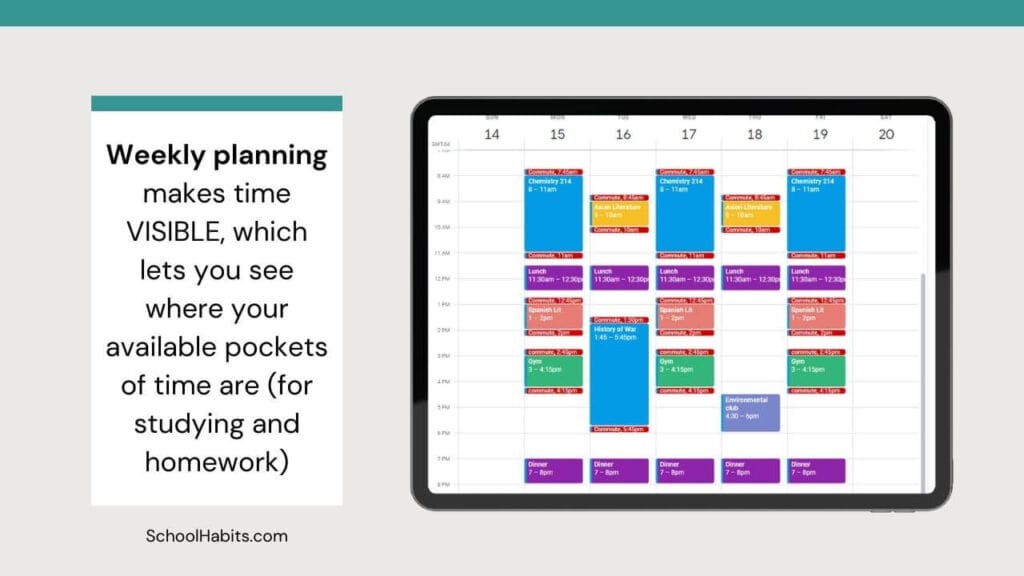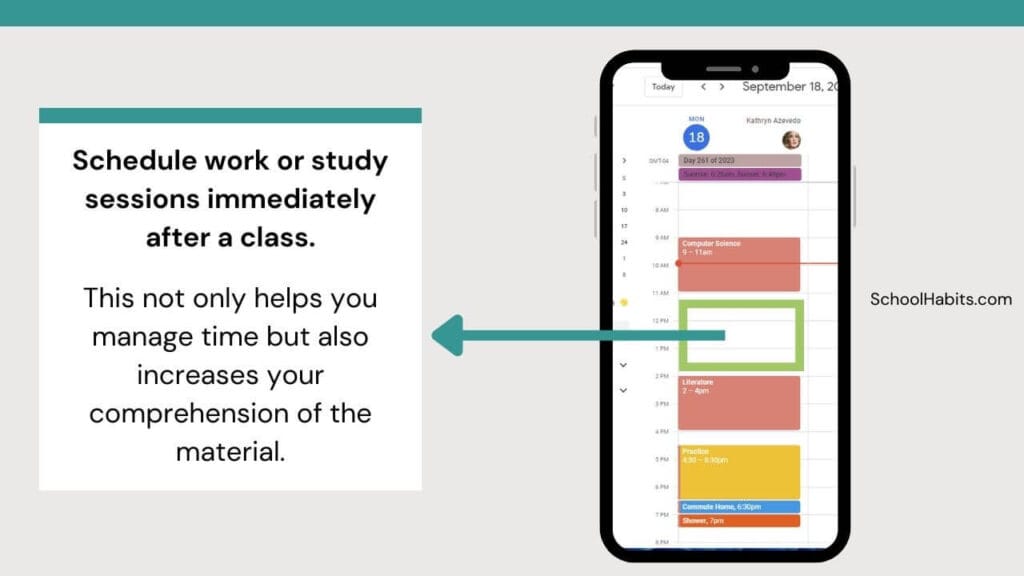
By Katie Azevedo, M.Ed.
Time management for college students is different from time management for high school students.
A typical college schedule has multiple open pockets of time scattered throughout the day. On the other hand, a typical high school schedule has one large chunk of time after school is dismissed.
For many students, managing the multiple scattered time pockets in college can be more challenging than managing a single chunk of time in high school.
This post teaches you how to manage time in college.
How to manage time in college: 4 time management tips for college students
The following time management tips are for college students of all ages – from freshman year to senior year. If you’re in graduate school, you should check out my study tips for graduate students.
1. Master Weekly Planning
I strongly suggest that college students master weekly planning. You can start with the Sunday Routine that I teach you about here.
Weekly planning means that once a week (on Sundays, for example) you sit down with your calendar, your learning management system, and your assignment notebook. With these three resources, you do the following:
- Map out the week ahead and make sure you know what’s happening on each day
- Confirm assignment deadlines and add them to the calendar
- Confirm what tests you have and add them to the calendar
- Check for any out-of-the-ordinary commitments (meetings, appointments, etc.) and add them to the calendar
- Identify where your pockets of “free” time are throughout the week. These pockets of “free” time are when you will do your homework, reading and studying
This is my Google Calendar Tutorial For Students that teaches you exactly how to identify the pockets of “free” time I referred to in the previous paragraph.

2. Use Routine-Driven Productivity
Another tip for managing time in college is to use routine-driven productivity to create predictable routines for each day of the school week.
In college, your course schedule will vary from day to day but it won’t vary much from week to week. In other words, each Monday will generally look the same, each Tuesday will look the same, and so on.
Routine-driven productivity means that you design your schedule so that you’re doing the same thing every Monday, the same thing every Tuesday, etc.
So for example, if every Monday you have computer science from 9:00-11:00 AM and a literature course from 2:00-4:00, you could grab a to-go lunch from the campus cafe after computer science and head straight to the library to work on your computer science homework until literature begins at 2:00.
This would become your Monday routine. Computer science class, then computer science homework and lunch in the library from 11:30 to 1:45 ish, and then literature class. Every Monday. Like clockwork.
Why does this work? When you assign predictable academic tasks to your week (on Mondays I always do my comp sci homework in the library between classes), you never have to wonder when you’ll get your comp sci homework done. It gets done on Mondays between 11:30 and 1:45. Every Monday. Like clockwork.
You would apply the same routine-driven productivity scheduling to each day of the week, creating structure and clarity around what you’re doing and when.
If you’re in graduate school and you’re also working, you want to be sure you’re using these 5 work productivity tips for students with jobs.
3. Use Pockets of Time During the Day
High school students are used to doing homework and studying in the evening, after school gets out, and after all the sports and extracurriculars are over.
To manage time in college, you need to think differently. As I’ve addressed already in this post, you have open pockets of time throughout the day between classes. This is the time you should be using for homework and studying.
In high school, you might have done most of your homework from 7:00 to 11:30 at night. But in college, you should use your mornings and afternoons to get your work done. If you master weekly planning (Tip #1) using my Google Calendar Strategy and use routine-driven productivity (Tip#2), then you can see exactly where these pockets of time are. Identify them and use them. You can also use some of these cool advanced Pomodoro techniques to bang out a bunch of tasks.
Believe it or not, it’s possible to go through college without pulling all-nighters and chaotic late nights at the library. If you change your mindset about when you do homework, then you can reasonably get your work done throughout the day – leaving your evenings open for all the other things college has to offer.
The benefit of using small pockets of time in your day to work on assignments is that you’re tapping into the power of Parkinson’s Law. (Have you heard of it?) Here’s how to use Parkinson’s Law to get your work done in smaller pockets of time.
4. Plan a Work Session Right After a Class
The best time to be productive can be immediately after you get out of a class. If your schedule allows, I suggest you plan a homework or study session immediately after class is dismissed. This is something you can plan for ahead of time using all 3 prior time management tips in this post (weekly planning, routine-driven productivity, and using daily time pockets efficiently).
Here’s how this time management strategy works:
- Go to class.
- When class is over, head directly to a quiet location somewhat near the location of your class. It can be in the same building or maybe just a short walk away, but certainly not across campus.
- Depending on how much time you have available, spend 30-90 minutes doing any of the following:
- your homework from the class you just left
- reviewing the notes you just took and filling in the gaps
- making study materials or studying for upcoming tests

Doing a work or study session immediately after a class is not only a time management strategy that increases productivity, but it’s also a learning strategy that increases your comprehension of the material you just covered in class. It’s a win-win.
If you’re still eager to learn more about how to manage time in college, I’ve listed some of my best time management resources below.
- A valuable resource for parents: My FREE guide to teaching time management to your child
- 3 Time Management Traps That Are Consuming All Your Time
- Time Management Tips for School and Work
- 15 Tips for Balancing School and a Part-Time Job
- A Time Management Secret: The Real Cost of Doing Things

